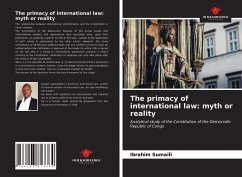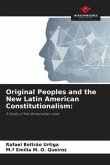The relationship between international commitments and the Constitution is more complex.The Constitution of the Democratic Republic of the Congo states that "international treaties and agreements duly concluded have, upon their publication, an authority superior to that of the laws, subject to the application of each treaty or agreement by the other party". However, the same Constitution of 18 February 2006 provides that any conflicts of norms must be settled before the ratification or approval of the treaty. Its article 216 is based on the fact that if a treaty or international agreement contains a clause contrary to the Constitution, ratification or approval can only take place after the revision of the Constitution.When it is not possible to understand, or at least to interpret these provisions in a consistent or uniform manner, since the judge refuses to give precedence to one norm over another, how can a plausible solution be found?The answer to this question forms the very framework of this study.
Bitte wählen Sie Ihr Anliegen aus.
Rechnungen
Retourenschein anfordern
Bestellstatus
Storno








